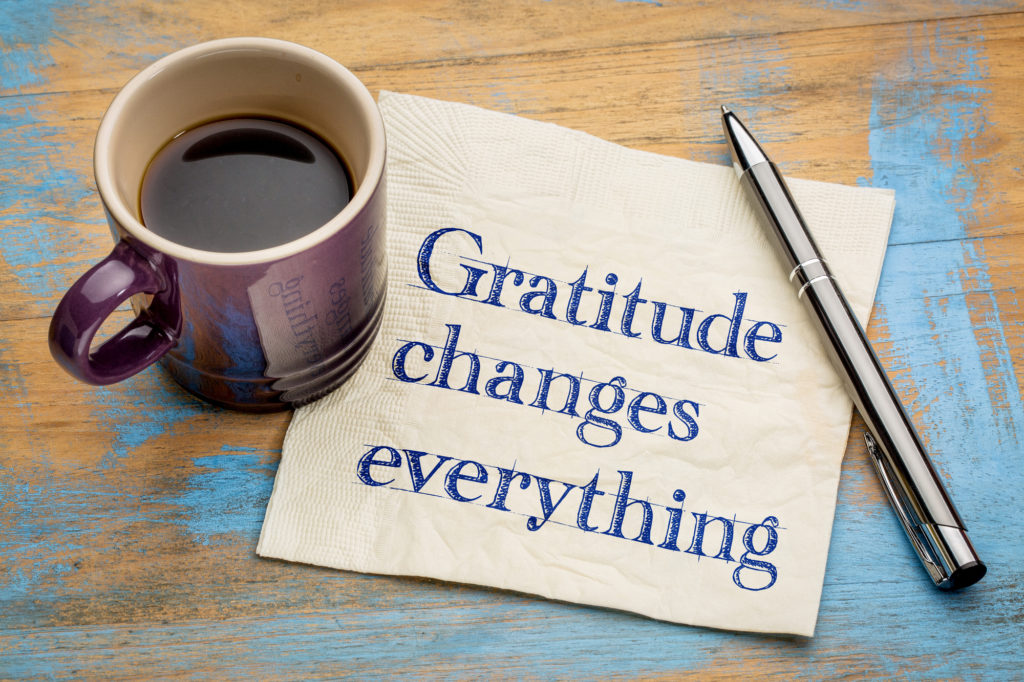
“The only way you learn persistence is by going through challenging times.”
What toll are the stressors of this COVID-19 chaos having on you, your relationships, and your business? At this very moment, as you read this, how has the stress produced by the past few months impacted your physical, emotional, and spiritual well-being?
How much sleep have you lost worrying about finances, employment, your children’s education, and what life will be like as we move into a new normal?
How you and I handle these questions will depend on our mindset. Will you follow the popular cultural norm of the “victimhood culture,” which has turn grievance, complaining, and blaming into a fad? Or will you choose a more effective and profitable action that will take you to a better place?
Gratitude is the antidote to COVID-19 stress!
I am going to give you one of the most important things you can begin doing right now to help relieve some of the stress. If you try this, it will help you start to feel more hopeful. And the great news is that it will not cost you anything.
The number one best way to begin reducing stress in your life is to have a sense of gratitude. Having an attitude of gratitude is one of the quickest ways to strengthen your personal resilience. And as a reminder, resilience is the ability to adapt well in the face of adversity.
Personal resilience is your ability to bounce back, pick yourself up, and try again until you either succeed or decide in a more productive direction. Resilience is your ability to see yourself in the dark abyss of failure, anxiety, humiliation, or depression and bounce back. Personal resilience helps you not only get back to where you were before but to even greater heights of happiness, success, and inner strength. Resilience enables you to withstand adversity. Try and think of it as a form of immunity that helps you make the right decisions under pressure. (Stronger: Everly, 2015)
Spiritual leaders, scholars, and scientists throughout history have discussed the benefits of gratitude and how it enhances our resilience for thousands of years. Additionally, in the past few years, there have been numerous studies that scientifically validate the benefits of gratitude.
Gratitude can be a helpful antidote to anxiety and stress. But what good is an attitude of gratitude in a crisis?
The word gratitude comes from the Latin work gratis, more precisely gratus, which means grateful or thankful. As a quick side note: Mrs. Ruffo, my eighth-grade Latin Teacher while I attended Fort Valley High School in Fort Valley, Georgia, is probably smiling down from Heaven. I am thankful to her for teaching me an appreciation for ancient languages.
Gratitude is an attitude that demonstrates grateful appreciation.
Gratitude helps people connect to something bigger than themselves as individuals, whether to other people or God.
Gratitude makes your life happier and more satisfying. When we feel gratitude, we benefit from the pleasant memory of a positive event. Also, when we express our gratitude to others, we strengthen our relationship with them.
Psalm 107:1 says, “Give thanks to the Lord, for He is good, and His Love endures forever.”
I want to give you seven things you can do to push back the tyranny of fear, doubt, and darkness with a dose of gratitude.
Gratitude is the thankful appreciation of things received, whether tangible or intangible. It helps you and me connect with something outside of ourselves, often transcendent and more significant than we are. Being grateful for people, and other blessings make me thankful, but it also helps rewire my brain to be more optimistic.
Here are some of the individual benefits of practicing gratitude.
- Increased joy, happiness, and positive mood
- More satisfaction with life
- Less materialistic
- Less likely to experience Compassion Fatigue and Burnout
- Better physical, emotional, mental, and spiritual health
- Increased restful sleep
- Less tiredness and fatigue
- Lower levels of cellular inflammation
- Increased personal resilience
- Encourages the development of patience, humility, and wisdom
For Groups:
- Increases positive prosocial behaviors
- Strengthens relationships
- Enhanced corporate and ministry resilience
- Boosts employee effectiveness and productivity
- Improves job satisfaction[i]
Now that is an impressive list, I have to admit that I was refreshed and encouraged to do the research for this article as I reviewed the benefits of being grateful.
Now, let’s move into some practical ways to become more efficient in being grateful.
Here are seven suggestions that will expand your sense of gratitude, enhance your personal resilience, and increase your health.
1. Write a handwritten note and mail it to someone you appreciate. Alternatively, invite that person to lunch or coffee and personally deliver your handwritten thank-you note. People love this because so many people have forgotten the lost art of a personal note.
2. Tweet, Instagram, or Facebook, something you are thankful for.
3. Smile and be gracious to everybody. When that jerk in traffic cuts you off, say a prayer for individual instead of some hand gesture.
4. Notice and be thankful for what you have.
5. Find creative ways to connect with family and friends that you have not seen for a while.
6. Say thank you to someone every day.
7. Leave a bigger tip
Remember, one of the cheapest and most efficient ways to develop Psychological Body Armor™ is developing an Attitude of Gratitude.
Gratitude makes your life happier and more satisfying. When we feel gratitude, we benefit from the pleasant memory of a positive event. Besides, when we express our gratitude to others, we strengthen our relationship with them.
An Ancient Story about Gratitude
The New Testament book of Luke, chapter 17, tells the story of Jesus healing 10 lepers.COVID
Here is a recap of the story.
Jesus is traveling towards Jerusalem with his disciples and was at the border between Galilee and Samaria. As he entered a village, ten men with leprosy, practicing social distancing, cried out, “Jesus, Master, have mercy on us!”
He looked at them and said, “Go show yourself to the priest.” (which was the medical best practice for their time) And as they went, they were cleansed of their leprosy.
Only one of them, when he saw that he was healed, came back to Jesus, shouting, “Praise God!” He fell on the ground at Jesus’ feet, thanking him for what he had done. The Bible tells us that he was a Samaritan. ( I would encourage you to read about the Samaritan’s who were seen as inferior to their Jewish counterparts)
In this story, Jesus was stunned and asked, “Didn’t I heal ten men? Where are the other nine? Has no one returned to give glory to God except this foreigner? And Jesus said to the man, “Stand up and go. Your faith has healed you.
When we look a the practice of gratitude, we should see it as a spiritual discipline that helps us spiritually realign with the Lord, who is the Giver of life.
Some have even called gratitude a “gateway” spiritual discipline.[ii]
Psalm 100:4 commands us to “Enter his gates with praise. Give thanks to him and praise his name. Psalm 100:4 NLT.
Do you know that even with the stress and uncertainty of the COVID Chaos, we can lower our stress and increase our hope, faith, and personal resilience by finding ways to express gratitude and thankfulness?
How about you?
Call to action:
- Do a quick personal inventory regarding your own attitude and grade yourself.
- Pick on or two of the practices I suggested and begin doing them now.
- Receive my Free Reboot PDF, which has 6 proven strategies for Rebooting Our Lives as we move into the new normal.
- If you feel a need for counseling, I offer a free 20-minute telephonic assessment. All you need to do is call me 505-343-2011, leave a message on my secure voicemail, or shoot an email to john@johnthurman.net.
I hope you have a great week.
John Thurman
PRVB 356
Why don’t we begin a conversation? Feel free to leave a comment in the comment section.
Have an Awesome Day!
[i] Miller, Kory D. (May 5, 2020) https://positivepsychology.com/benefits-of-gratitude/
[ii] Demeter, Eric, (November 28, 2019) https://positivepsychology.com/benefits-of-gratitude/


Thank you John
I would like to read the Reboot PDF
The easiest way to get your copy is to text the work REBOOT to 33777.